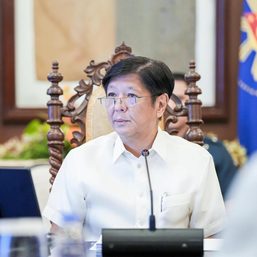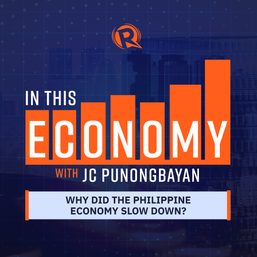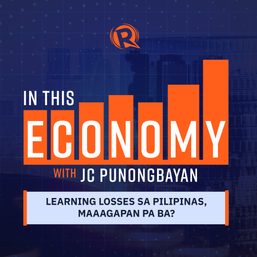SUMMARY
This is AI generated summarization, which may have errors. For context, always refer to the full article.
![[In This Economy] Is Marcos slamming the brakes on Maharlika for the right reasons?](https://www.rappler.com/tachyon/2023/10/tl-maharlika-slammed.jpg)
Less than three months since President Ferdinand Marcos Jr. signed the law creating his pet Maharlika Investment Fund, he himself is slamming the brakes on it. Hard.
It turns out that on October 12, 2023, Marcos issued a memo directed at the officer-in-charge of the Bureau of the Treasury, as well as the presidents and CEOs of the Land Bank of the Philippines (LBP) and the Development Bank of the Philippines (DBP).
The memo directed these agencies to immediately suspend the implementation of the Maharlika Investment Fund law’s implementing rules and regulations, “pending further study thereof.”
The Office of the Executive Secretary elaborated: “President Ferdinand R. Marcos Jr. issued a suspension because he wanted to study carefully the IRR to ensure that the purpose of the fund will be realized for the country’s development with safeguards in place for transparency and accountability.”
On the surface, it looks like a sound move. Senate President Juan Miguel Zubiri thought it was a “very prudent move.” He added, “When so much money is at stake, it is better to proceed with an abundance of caution than to be reckless.”
This made me LOL. Lest many of us forget, it was Zubiri who shepherded the Maharlika bill in the Senate, and oversaw its rushed passage in the wee hours of May 31, 2023.
Then on June 21, the enrolled Maharlika bill was flown all the way to Washington, DC, just so Zubiri – who had an engagement there – could sign the document ASAP. This was a few weeks before Marcos’ second State of the Nation Address.
In short, Zubiri, along with nearly all other lawmakers in both the House of Representatives and the Senate, were the ones who pushed Maharlika with an abundance of recklessness.
Red flags galore
This, despite plenty of concerns raised by many economists and analysts who saw, from a mile away, Maharlika’s red flags.
In early June, I and 20 other colleagues at the UP School of Economics published a discussion paper that aimed to comprehensively discuss many of the flaws of the Maharlika fund. We said that the goal of the fund was ill-defined and ill-thought, its funding posed huge risks to the public coffers, there were several problems when it comes to its governance structure, and it’s also ill-timed, given global economic headwinds. You can read the full text here.
Meanwhile, as early as December 2022, my friend and economist colleague Enrico Villanueva of UP Los Baños was already raising concerns about the potential effects of Maharlika on LBP and DBP.
For instance, he once tagged on Twitter/X the account of LBP and asked, “Puwede po bang malaman ano ang epekto nito sa capital adequacy, leverage at liquidity coverage ratios ng LBP?” (May we know the effects [of Maharlika] on LBP’s capital adequacy, leverage, and liquidity coverage ratios?)
Later, he crunched the numbers and foresaw that both LBP and DBP’s so-called capital adequacy and leverage ratios will be severely compromised by Maharlika, since the fund essentially forces these state-owned banks to give up, in one fell swoop, a total of P75 billion of their capital. That’s not an amount to sneeze at.
Guess what. Enrico’s fears have been realized.
On October 11, it was revealed that both LBP and DBP already sought “regulatory relief” from their regulator, the Bangko Sentral ng Pilipinas.
Basically, both banks are trying to get exempted from the BSP’s capital adequacy ratios (in turn adopted from international banking regulations), because of the whopping P75 billion they had already remitted to the Treasury for Maharlika.
DBP’s president himself had admitted to Rappler that, because of Maharlika, they will already “breach” their capital ratios below what’s required of them.
Without such regulatory relief, they may be penalized by the BSP in one way or another.
In the UPSE discussion paper, we wrote: “Draining capital from state banks like the LBP and the DBP risks destabilizing these institutions and compromises their ability to meet BSP’s capitalization requirements.”
Besides that, such siphoning of capital also hurts the ability of these banks to fulfill their mandates of supporting and spurring rural development, since many of their clients are individual farmers, cooperatives, and small businesses.
Perhaps most importantly, lack of sufficient capital weakens the position of these banks by making them vulnerable to, say, bank runs. If confidence in these banks collapses and depositors withdraw their funds en masse, they don’t have adequate capital to serve as buffers, and this might trigger contagion in the banking sector. Avoiding banking crises is precisely why international banking regulations (specifically, capital adequacy requirements) were put in place to begin with.
It’s just saddening that it takes major threats to state-owned banks to slam the brakes on an ill-thought and ill-timed law.
But is that even the reason?
Wrong reasons
Rumor has it that the suspension of Maharlika’s implementation has more to do with the idea that Marcos wants greater elbow room in appointing the leaders of Maharlika.
A shortlist of people was already sent to the Palace, but Marcos is allegedly bent on appointing current Finance Secretary Benjamin Diokno as Maharlika’s president and CEO. (Diokno is not on the shortlist now, since according to the Maharlika law, the finance secretary is the ex-officio chairman of Maharlika’s board of directors).
If true, this plays into persistent rumors that there will soon be a major shakeup in the Marcos Cabinet, including the finance portfolio.
But this also tells us that Marcos may have suspended Maharlika for the wrong reasons.
At the end of the day, the Maharlika law is still a law. And there’s a very fat chance that Congress will repeal the Maharlika law any time soon.
What I’m afraid of is that prospective foreign investors will be even more hesitant to invest in the Philippines. Apart from Maharlika’s all-too-real threats to state-owned banks, second thoughts on the fund’s implementation provide wrong signals. The last thing investors want is policy uncertainty.
Worse, we might also see credit rating downgrades down the line – on top of anemic economic growth, persistently high inflation, and unabated deficits and debt.
Let’s see how this will play out. Abangan ang susunod na kabanata. – Rappler.com
JC Punongbayan, PhD is an assistant professor at the UP School of Economics and the author of False Nostalgia: The Marcos “Golden Age” Myths and How to Debunk Them. JC’s views are independent of his affiliations. Follow him on Twitter (@jcpunongbayan) and Usapang Econ Podcast.
1 comment
How does this make you feel?
![[In This Economy] Marcos’ POGO ban is popular, but will it work?](https://www.rappler.com/tachyon/2024/07/thought-leaders-marcos-pogo-ban.jpg?resize=257%2C257&crop=255px%2C0px%2C720px%2C720px)
![[Rappler Investigates] POGOs no-go as Typhoon Carina exits](https://www.rappler.com/tachyon/2024/07/newsletter-graphics-carina-pogo.jpg?resize=257%2C257&crop=424px%2C0px%2C1080px%2C1080px)







![[WATCH] #TheLeaderIWant: Filipino voters sound off on community issues a year before 2025 elections](https://www.rappler.com/tachyon/2024/05/filipino-voters-sound-off-on-community-issues-1.jpg?resize=257%2C257&crop=276px%2C0px%2C720px%2C720px)
![[In This Economy] Delulunomics: Kailan magiging upper-middle income country ang Pilipinas?](https://www.rappler.com/tachyon/2024/07/in-this-economy-upper-middle-income-country.jpg?resize=257%2C257&crop=421px%2C0px%2C1080px%2C1080px)




![[EDITORIAL] Apat na taon na lang Ginoong Marcos, ‘di na puwede ang papetiks-petiks](https://www.rappler.com/tachyon/2024/07/animated-bongbong-marcos-2024-sona-day-carousel.jpg?resize=257%2C257&crop=280px%2C0px%2C720px%2C720px)

![[EDITORIAL] Marcos Year 2: Hilong-talilong](https://www.rappler.com/tachyon/2024/07/animated-bongbong-marcos-2nd-sona-carousel.jpg?resize=257%2C257&crop=136px%2C0px%2C720px%2C720px)
![[Newspoint] A fighting presence](https://www.rappler.com/tachyon/2024/07/thought-leaders-a-fighting-presence.jpg?resize=257%2C257&crop=441px%2C0px%2C1080px%2C1080px)
Thanks to Prof. JC Punongbayan for another enlightening economic article, “Is Marcos slamming the brakes on Maharlika for the right reasons?” The problem is that President Marcos did not admit that he indeed slams the brake. Looks similar to the Sugar Order No. 4 (Sugar Importation Fiasco 1.0) signed by Agriculture Usec. Leocadio Sebastian on behalf of the President but later rejected by President Marcos Jr. himself. This is because in this recent issue: “In an Oct. 12 memorandum signed by Executive Secretary Lucas Bersamin by authority of the President,” the President is flip-flopping again. Indeed, “… prospective foreign investors will be even more hesitant to invest in the Philippines. … The last thing investors want is policy uncertainty.” (Note: the Policy Uncertainty is caused by an Uncertain Mind.)